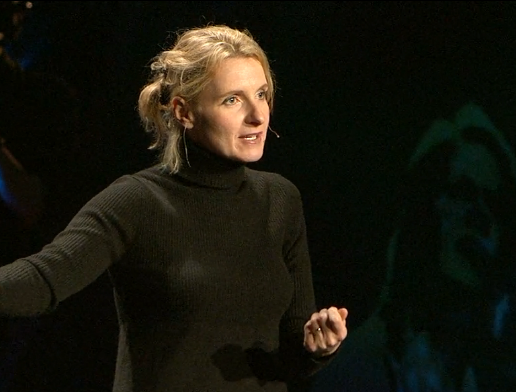And for me, the best contemporary example that I have of how to do that is the musician Tom Waits,
就我所知的當(dāng)代藝術(shù)家中,將這一問(wèn)題處理得最好的是音樂(lè)家湯姆·威茲。
who I got to interview several years ago on a magazine assignment.
幾年前,我就一個(gè)雜志工作采訪過(guò)他,
And we were talking about this, and you know, Tom, for most of his life,
當(dāng)時(shí)我們談及了這一問(wèn)題,
he was pretty much the embodiment of the tormented contemporary modern artist,
湯姆是備受創(chuàng)作壓力折磨的現(xiàn)代藝術(shù)家的典型,
trying to control and manage and dominate these sort of uncontrollable creative impulses that were totally internalized.
大半生時(shí)間,他都在努力地控制,管理并主宰那不可控的內(nèi)在創(chuàng)作靈感。
But then he got older, he got calmer, and one day he was driving down the freeway in Los Angeles, and this is when it all changed for him.
但隨著年紀(jì)漸長(zhǎng),他變得沉靜內(nèi)斂了,他告訴我說(shuō):一天他在洛杉磯高速公路開(kāi)車(chē),這時(shí)發(fā)生了一件改變他一生的事情。
And he's speeding along, and all of a sudden he hears this little fragment of melody,
他正在加速前行,突然,他隱約聽(tīng)到了一小段優(yōu)美的旋律,
that comes into his head as inspiration often comes, elusive and tantalizing, and he wants it, it's gorgeous,
這旋律莫名地進(jìn)入他的腦海,就像靈感來(lái)臨時(shí)那樣,捉摸不定而誘人心弦,
and he longs for it, but he has no way to get it. He doesn't have a piece of paper, or a pencil, or a tape recorder.
他急切地想要捕捉它,但是沒(méi)有辦法,他既沒(méi)有紙筆,也沒(méi)有錄音機(jī)。
So he starts to feel all of that old anxiety start to rise in him like,
他感覺(jué)到那種熟悉的創(chuàng)作焦慮又在他體內(nèi)集聚,
"I'm going to lose this thing, and I'll be be haunted by this song forever.
“我就要失去這個(gè)靈感了,然后這首曲子會(huì)永世陰魂不散地折磨我”。
I'm not good enough, and I can't do it." And instead of panicking, he just stopped.
“我根本不行,我做不到” 突然,他奇異般地停止了。
He just stopped that whole mental process and he did something completely novel.
他沒(méi)有了繼續(xù)抓狂和焦躁的情緒,然后做了一件不尋常的事情。

He just looked up at the sky, and he said, "Excuse me, can you not see that I'm driving?"
他抬頭望向天空,對(duì)它說(shuō)道:“不好意思,您沒(méi)看到我正在開(kāi)車(chē)嗎?”
"Do I look like I can write down a song right now?
我看上去像是能立馬記下一首曲子的樣子嗎?
If you really want to exist, come back at a more opportune moment when I can take care of you.
如果你真想在世上流傳,另挑個(gè)合適的時(shí)間再來(lái)吧,在我方便的時(shí)候。
Otherwise, go bother somebody else today. Go bother Leonard Cohen."
或者,你可以今天去騷擾別人,去找萊昂納德·科恩去。”
And his whole work process changed after that. Not the work, the work was still oftentimes as dark as ever.
自從那件事以后,湯姆的整個(gè)創(chuàng)作過(guò)程改變了,不是作品變了,他的作品仍是一如既往的黑暗。
But the process, and the heavy anxiety around it was released when he took the genie,
但當(dāng)他把創(chuàng)作天才從自身剝離開(kāi)來(lái)時(shí),伴隨著創(chuàng)作過(guò)程的嚴(yán)重焦慮也被化解了。
the genius out of him where it was causing nothing but trouble, and released it back where it came from,
將創(chuàng)作靈感歸于自我,只是帶來(lái)痛苦與麻煩,將它解放出來(lái),倒像是放歸原處。
and realized that this didn't have to be this internalized, tormented thing.
同時(shí)他也意識(shí)到,他原本無(wú)需將創(chuàng)作靈感內(nèi)化于自身,自我折磨。
It could be this peculiar, wondrous, bizarre collaboration,
創(chuàng)作靈感可以是他和這一外部未知存在之間奇異、奇妙又奇怪的合作關(guān)系,
kind of conversation between Tom and the strange, external thing that was not quite Tom.
那是一個(gè)自身以外的存在。



